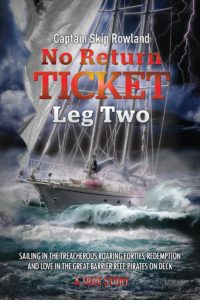
A lengthy adventure tale By Captain Skip Rowland
I have to be honest here. A good adventure experience does not assure a good adventure story.
Good adventure stories aren’t about the adventure at all, and good writers know this. Every sailor who has set off toward the horizon has had experiences that would terrify any armchair captain. But rogue waves, powerful storms, and dangerous reefs don’t in themselves make for good adventure stories. A good sailing story has to appeal to sailors and non-sailors alike.
Skip Rowland’s No Return Ticket has a reason for being told, and it is told well. When I finally got the time to pick up the first of the two books in the series, I read it straight through, blowing off several other things I had on my calendar for the afternoon. That’s usually a good sign. The voice is unique and salty, and it is clear from the start that Rowland didn’t set out to manufacture a story worth telling.
The story opens with Captain Skip crossing the US border into Mexico, armed and looking for the men who stole and torched his ketch Love Story, and it doesn’t get less interesting from there.
What we get with No Return Ticket is a story that hits all the marks. Captain Skip is a restless soul in the soul-crushing glitz of Southern California in the late 1980s. He has everything he needs but nothing he wants, and his “escape” from California onto the Pacific Ocean is the literary catalyst the story needs to begin properly. 
When I read sailing stories, I have a hard time quieting the critic in my head. “Why are you out there? What are you looking for?” In too many cases, they are looking for a story. Rowland isn’t looking for anything except to be on the water, so after fashioning his escape to the sea, everything that happens is just a part of the adventure. Skip is just sailing, and the book writes itself.
This isn’t a literary masterpiece, but as sailing books written by sailors go, it is quite good. Rowland’s voice is true and edgy while not being alienating. The character of Captain Skip comes through from the opening chapter, and even when he isn’t being knocked down or grounded we want to follow him.
It is in those pivotal, stressful moments that Captain Rowland’s writing is at its best, however. Anyone who has been on the deck of a boat in distress knows the feeling of absolute chaos and calamity that comes with an emergency at sea. Rowland masterfully slows down time in these sections, giving the reader a clear understanding of the situation while also expressing the fear and danger. It is remarkable how well he captures that strange combination of bedlam and absolute calm that washes over you while all hell is breaking loose onboard.
Most good writers don’t easily give up their desks to put themselves in harm’s way for the sake of perhaps encountering a daring tale worth telling. For those of us who love a good adventure story, No Return Ticket is an excellent addition to the bookshelf.